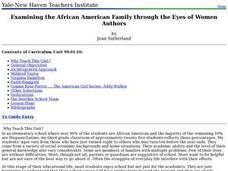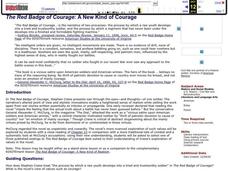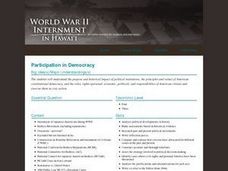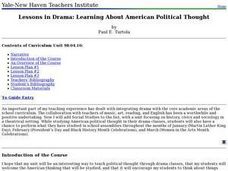Curated OER
African Americans in the Civil War
Students examine the contributions of African American soldiers during the Civil War. In pairs, they complete Civil War timeline worksheets. They use character cards to assume the identities of African Americans and determine whether or...
Curated OER
African Americans in World War II: Staging a Double V Campaign in the Classroom
The feelings and attitudes of African-Americans during World War II are examined by high schoolers. After watching various clips from "The War," they answer comprehension questions for each section. In groups, they create their own...
Curated OER
The Civil War in Art and Literature
Pupils examine art related to the Civil War. They participate in activities that allow them to write poetry and drawings. They create their own journal and collect their work in a binder.
PBS
Think Like a Historian: A Viewing Guide
Calling all junior detectives! Scholars use the tools of investigation to determine the causes and impacts of the American Civil War. Using viewing guides, videos, group research, and written resources, they discover what it takes to...
Curated OER
After Reconstruction: Problems of African Americans
Students describe issues or problems facing African Americans following Reconstruction. They explain possible solutions to these problems suggested in the sources you find, and cite arguments for and against these solutions.
Curated OER
Lincoln's Legend and Legacy
Learners evaluate Lincoln's impact on American History. In this Civil War instructional activity, students view a film clip of writings about Lincoln. Learners take notes and compare how the writings define his legacy. Students write...
Curated OER
American Women Who Shaped the Civil Rights Movement Explored Through the Literature of Eloise Greenfield
Examine the women who contributed to the Civil Rights movement. In groups, children read excerpts of writings from Eloise Greenfield and research the women she mentions using the internet. To end the lesson, they create a timeline of...
Curated OER
Bake, Boil, or Fry
Learners write a journal entry about where there food comes from. For this Civil War lesson, students discuss journals, the crops grown within the U.S., the import/export process and what food preparation must have been like on a...
Curated OER
Examining the African American Family through the Eyes of Women Authors
Students read stories by women authors on the characteristics of the African-American family. Using the internet, they research the history of issues that have affected African-American families from the Civil War to the Civil Rights...
National Endowment for the Humanities
A Journalist’s Report: The Better Vision for Black Americans
After reading a series of primary source documents detailing the teachings of Martin Luther King, Jr. and Malcolm X, class members craft newspaper columns assessing the strengths and weaknesses of each man's vision, and present their...
Curated OER
The Red Badge of Courage: A New Kind of Courage
Students examine how Stephen Crane treats the process by which a youth matures in his novel the Red Badge of Courage. They study how he exemplifies manly virtues associated with soldiers in war and examine the three endings that were...
Stanford University
Martin Luther King, Jr. and Malcolm X: A Common Solution?
Much has been made of the differences between Martin Luther King, Jr. and Malcolm X. But was there any common ground between them? Class members reconsider what they think they know about these two civil rights leaders with...
Curated OER
Virtual Museum
Ninth graders explore various time-periods in American history. They select important events, people, places, and artifacts to explore. Students present their information to the class using PowerPoint.
Curated OER
African-American Folktales
Learners are introduced to the characteristics of folktales and their purpose. As a class, they listen to a folktale, answer questions about the characters and share which part they enjoyed the best. In groups, they compare and...
Curated OER
Unit 2: Post-Revolution: The Critical Period 1781-1878
The post-Revolutionary Period of 1781-1787, also known as the Critical Period, is the focus of a series of lessons that prompt class members to examine primary source documents that reveal the instability of the period of the...
Curated OER
Double V Campaign: Victory at Home and Victory Abroad
Students write a persuasive essay as if they were an African American in World War II and decide if they would contribute war bonds or not. In this World War II lesson plan, students study the segregation of World War II and the unity...
Albert Shanker Institute
Economic Causes of the March on Washington
Money can't buy happiness, but it can put food on the table and pay the bills. The first of a five-lesson unit teaches pupils about the unemployment rate in 1963 and its relationship with the March on Washington. They learn how to create...
Stanford University
Observing Human Rights Day
How much intervention is appropriate for America to take in cases of human rights violations? Class members ponder a question that has lingered since the birth of America with a series of primary sources that reflect the degree to which...
Curated OER
Participating in Democracy
Students analyze film clips in class. In this democracy lesson, students identify the differences between civil liberties, democracy and freedom. Students view a video regarding Japanese internment and answer study questions as well as...
Curated OER
Westward Expansion and the Frontier
Students explore U.S. history by researching a historic map. In this westward expansion instructional activity, students discuss the mystery of the western U.S. in the early 1800's and the impact expansion had on Native Americans and...
Curated OER
The Texas Cowboy: Myth and Reality
Learners create "cowboy ballads" in this interactive, multi-day instructional activity. The cowboy is researched using various sources and class discussions. Students evaluate individual work at the end of the instructional activity.
Fairfax Public Schools
Walter Dean Myers
If you are reading works by Walter Dean Myers in your class, this resource might be worth a look. Included here are activities and discussion questions for Malcolm X: By Any Means Necessary, Somewhere in the Darkness, Scorpions, Fallen...
Curated OER
Lessons in Drama: Learning About American Political Thought
Students develop critical thinking skills so that they may produce their own written plays or music from their thoughts and feelings. They express their thoughts based on what has been presented to them over the duration of the course.
PBS
The Sixties: Dylan Plugs in and Sells Out
Before Woodstock, there was Newport. Get plugged in to the social changes of the 1960s with a lesson plan that looks at Bob Dylan's performance at the 1965 Newport Folk Festival as a symbol of the radical changes that marked the era.























